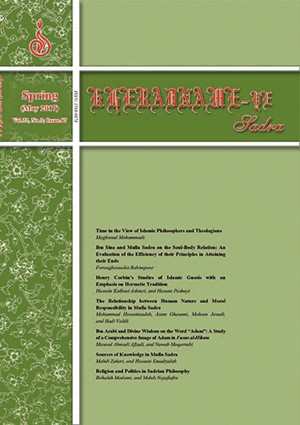-
-
List of Articles
-
Open Access Article
1 - foreword
Seyyed Mohammad Khamenei -
Open Access Article
2 - Time in the View of Islamic Philosophers and Theologians
Maqsud Mohammadi -
Open Access Article
3 - Ibn Sina and Mulla Sadra on the Soul-Body Relation: An Evaluation of the Efficiency of their Principles in Attaining their Ends
Furugh al-Sadat Rahimpoor -
Open Access Article
4 - Henry Corbin’s Studies of Islamic Gnosis with an Emphasis on Hermetic Tradition
Hossein Kalbasi Ashtari Hassan Pashayi -
Open Access Article
5 - The Relationship between Human Nature and Moral Responsibility in Mulla Sadra
Mohammad Hosseinzadeh Azam Ghasemi Mohsen Javadi Hadi Vakili -
Open Access Article
6 - Ibn Arabi and Divine Wisdom on the Word “Adam”: A Study of a Comprehensive Image of Adam in Fusus al-Hikam
Masood Ahmadi Afzadi Nawab Moqarrabi -
Open Access Article
7 - Sources of Knowledge in Mulla Sadra
Mahdi Zakeri Hossein Emadzadeh -
Open Access Article
8 - Religion and Politics in Sadrian Philosophy
Mehdi Najafiafra Rohalah Modami
-
The rights to this website are owned by the Raimag Press Management System.
Copyright © 2017-2026







